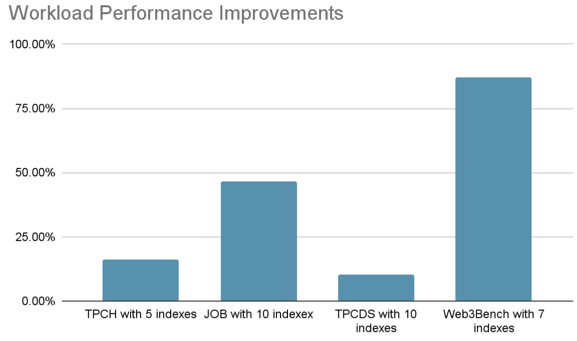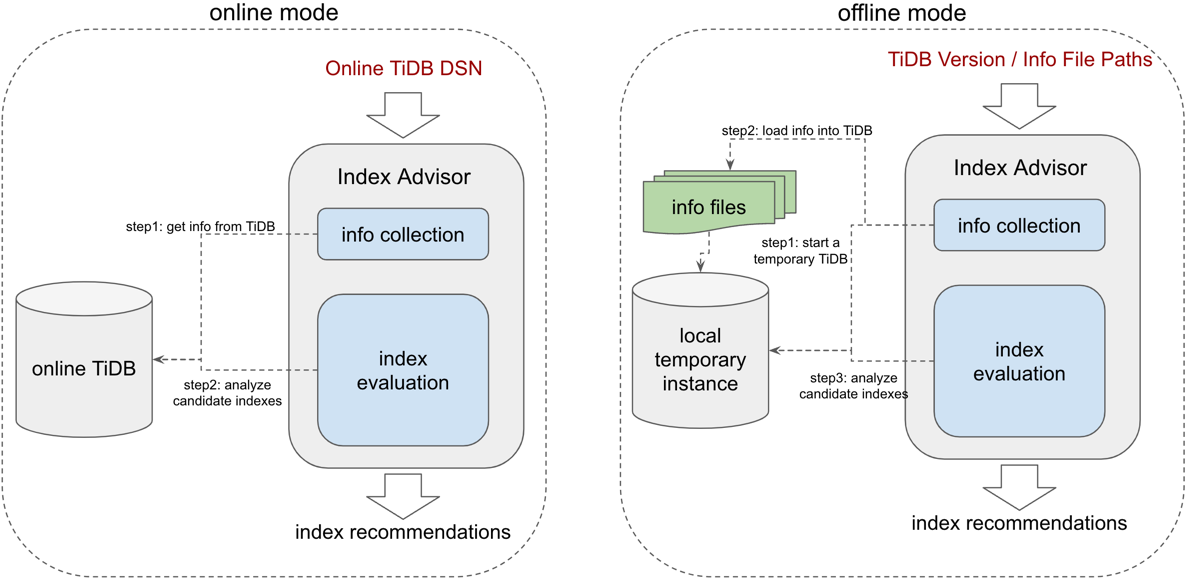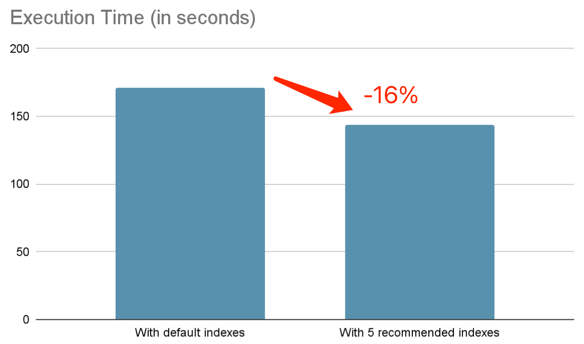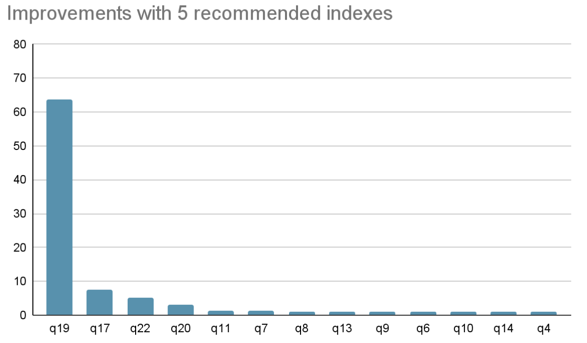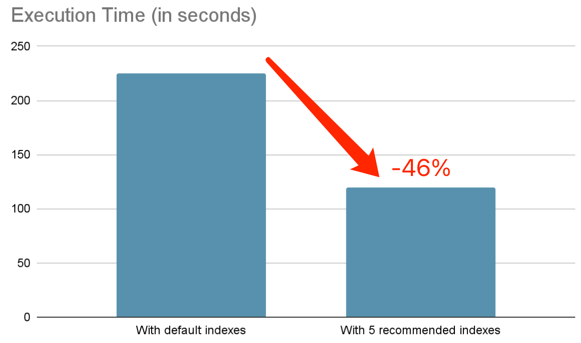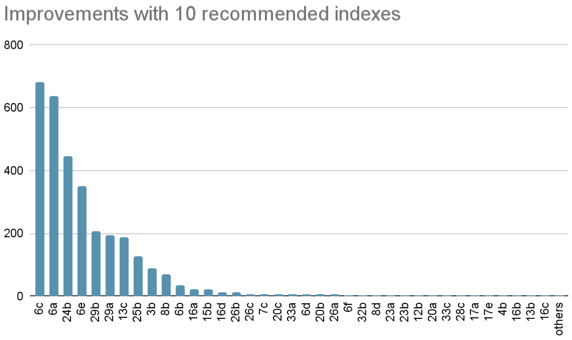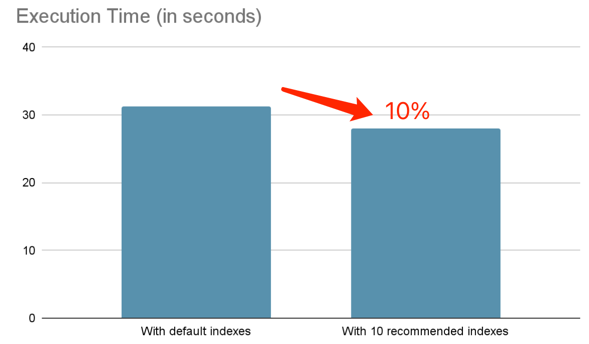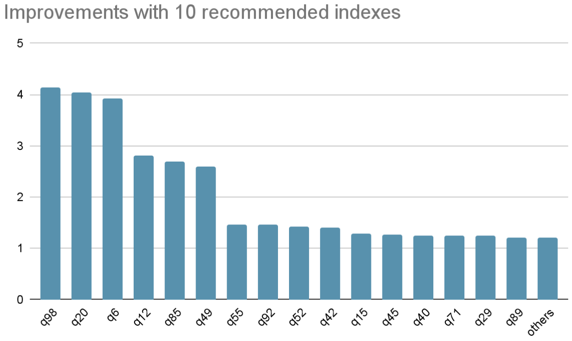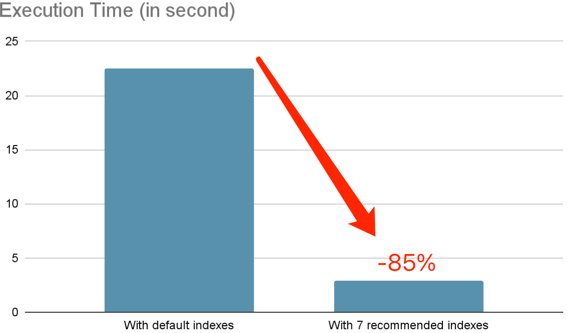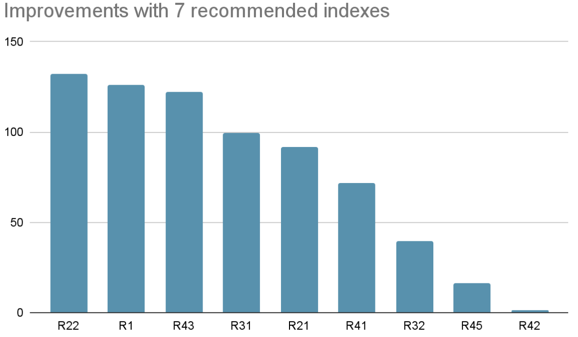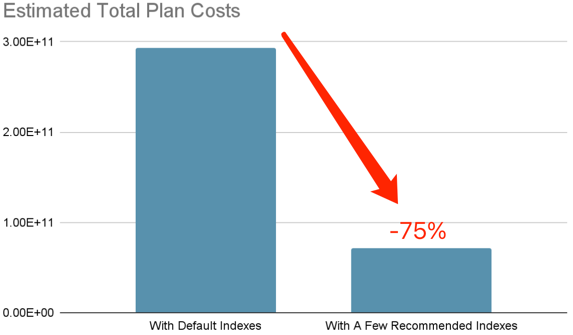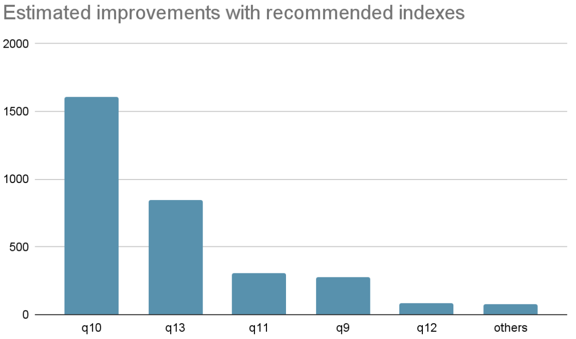Index selection is an important part of database performance tuning. However, it is a complex and time-consuming task. Even experienced experts can hardly guarantee to find the best index scheme accurately and quickly when facing a complex workload containing dozens or even hundreds of tables and thousands of SQLs.
TiDB Index Advisor (beta) is a command-line tool that can automatically recommend indexes based on the workload, statistics, and execution plan cost in TiDB, which can greatly reduce the workload of index maintenance in performance tuning.
Index Advisor is based on the Hypo Index feature of TiDB. This feature allows users to create and maintain a series of
hypothetical indexes in the optimizer. These indexes are only maintained in the optimizer and will not be actually
created, so the overhead is very low. Combined with the Explain statement, you can evaluate the impact of an index on
the query plan, and then determine whether the index is valuable.
The working principle of Index Advisor is as follows, which can be roughly divided into three steps:
- Index Advisor collects workload-related table structures, statistics, and related queries from the system tables of the TiDB instance.
- Index Advisor generates a series of candidate indexes based on the collected information, and uses Hypo Index to create these indexes.
- Index Advisor uses
Explainto evaluate the value of these indexes (whether they can reduce some queries' plan costs) and make recommendations.
In our experiments, it can bring significant performance improvement on these workloads (see Evaluation):
TiDB Index Advisor provides two ways to use it, offline mode and online mode:
- In online mode, you don’t need to prepare any data. Index Advisor will directly access your TiDB instance for index analysis and recommendation. During this period, it will read some system table information and create some Hypo Indexes, but it will not modify the data.
- In offline mode, Index Advisor will not directly access your TiDB instance. It will start a TiDB instance locally, import the data you provide, and then perform index analysis and recommendation.
Generally speaking:
- Online mode is easier to use and more secure, since you don't have to export any data from you cluster;
- Offline mode is more flexible, but you need to prepare some data in advance.
Install TiDB Index Advisor by running the following command:
curl --proto '=https' --tlsv1.2 -sSf https://raw.githubusercontent.com/pingcap/index_advisor/main/install.sh | shCheck whether Index Advisor can work:
> index-advisor --version
TiDB-index-advisor version Version: beta
GitHash: da76736de15f6a33376f4496feadb99d72ba7f21
GoVer: go1.21.0If you are going to use the offline-mode, you need to install TiUP first. Please use the following command to install TiUP:
curl --proto '=https' --tlsv1.2 -sSf https://tiup-mirrors.pingcap.com/install.sh | shIn online mode, Index Advisor will directly access your TiDB instance, so you need to ensure the following conditions:
- The TiDB version needs to be equal or higher than v7.3, so that the
Hypo Indexfeature can be used. (See workaround on FAQs if you are using a lower version of TiDB) - Index Advisor will read the query information from
Statement Summary(if the query file is not manually specified), so you need to ensure that theStatement Summaryfeature has been enabled and thetidb_redact_logfeature has been disabled, otherwise the query cannot be obtained from it.
You can use index_advisor precheck --dsn='root:@tcp(127.0.0.1:4000)' to check whether your cluster can meet the above
conditions.
The following is an example of using online mode:
index_advisor advise-online --dsn='root:@tcp(127.0.0.1:4000)' \
--max-num-indexes=5 \
--output='./data/advise_output'
The meaning of each parameter is as follows:
dsn: the DSN of the TiDB instance.max-num-indexes: the maximum number of recommended indexes, default5.output: the path to save the output result, optional; if it is empty, it will be printed directly on the terminal.
Below are some optional parameters to help you filter queries:
query-schemas: the schema names of queries to be analyzed, separated by commas, optional, e.g.db1,db2.query-exec-time-threshold: the threshold of query execution time(in milliseconds), e.g.300, queries that are running longer than or equal to this threshold will be considered.query-exec-count-threshold: the threshold of query execution count, e.g.20, queries that are executed more than or equal to this threshold will be considered.query-path: use this parameter to specify queries manually, it's the path of the query file (optional, if it is specified, the advisor will not read queries fromStatement Summary), which can be a single file (such asexamples/tpch_example2/queries.sql) or a folder (such asexamples/tpch_example1/queries).
See more examples on Usages.
Offline mode requires the following data:
- Query file (or folder): can be in the form of a single file or a folder.
- Folder: such as
examples/tpch_example1/queries, a folder, each file inside is a query. - Single file: such as
examples/tpch_example2/queries.sql, which contains multiple query statements separated by semicolons.
- Folder: such as
- Schema information file: such as
examples/tpch_example1/schema.sql, which contains the originalcreate-tablestatement separated by semicolons. - Statistics information folder: such as
examples/tpch_example1/stats, a folder, which stores the statistics information files of related tables. Each statistics information file should be in JSON format and can be downloaded through the TiDB statistics information dump.
After preparing the above files, you can directly use Index Advisor for index recommendation, such as:
index_advisor advise-offline --tidb-version=v7.3.0 \
--query-path=examples/tpch_example1/queries \
--schema-path=examples/tpch_example1/schema.sql \
--stats-path=examples/tpch_example1/stats \
--max-num-indexes=5 \
--output='./data/advise_output'The meaning of each parameter is as follows:
tidb-version: the TiDB version used. Index Advisor will start an instance of this version of TiDB locally.query-path: the path of the query file, which can be a single file (such asexamples/tpch_example2/queries.sql) or a folder (such asexamples/tpch_example1/queries).schema-path: the path of the schema information file (such asexamples/tpch_example1/schema.sql).stats-path: the path of the statistics information folder (such asexamples/tpch_example1/stats).max-num-indexes: the maximum number of recommended indexes, default5.output: the path to save the output result, optional; if it is empty, it will be printed directly on the terminal.
To simplify, you can also put all required files on the same directory, and then just
use --dir-path=examples/tpch_example1.
The output of Index Advisor is a folder (such as examples/tpch_example1/output),
which contains the following files:
summary.txt: the summary result, which contains recommended indexes and expected benefits.ddl.sql: DDL of all recommended indexes.q*.txt: expected benefit of each query in your workload, which contains the plan and plan cost before and after creating these recommended indexes.
Below is an example of examples/tpch_example1/output/summary.txt:
Total Queries in the workload: 21
Total number of indexes: 5
CREATE INDEX idx_l_partkey_l_quantity_l_shipmode ON tpch.lineitem (l_partkey, l_quantity, l_shipmode);
CREATE INDEX idx_l_partkey_l_shipdate_l_shipmode ON tpch.lineitem (l_partkey, l_shipdate, l_shipmode);
CREATE INDEX idx_l_suppkey_l_shipdate ON tpch.lineitem (l_suppkey, l_shipdate);
CREATE INDEX idx_o_custkey_o_orderdate_o_totalprice ON tpch.orders (o_custkey, o_orderdate, o_totalprice);
CREATE INDEX idx_ps_suppkey_ps_supplycost ON tpch.partsupp (ps_suppkey, ps_supplycost);
Total original workload cost: 1.37E+10
Total optimized workload cost: 1.02E+10
Total cost reduction ratio: 25.22%
Top 10 queries with the most cost reduction ratio:
Alias: q22, Cost Reduction Ratio: 1.97E+08->4.30E+06(0.02)
Alias: q19, Cost Reduction Ratio: 2.89E+08->1.20E+07(0.04)
Alias: q20, Cost Reduction Ratio: 3.40E+08->4.39E+07(0.13)
...
Above is the summary of the recommendation, which contains the recommended indexes, the expected benefits to the entire workload, and the expected benefits of the top 5 queries.
Some explanations:
- We'll integrate this tool into our cloud platform in the future to make it more convenient to use on cloud.
- This tool can work for both new systems (no indexes) and existing systems. For existing systems, it will not recommend indexes that already exist.
- Usually, this tool takes a few minutes to finish the recommendation.
- There is another alternative tool called index-insight that works
as a diagnostic tool for index recommendation in TiDB Clinic, here are the differences:
- index-insight is only for cloud, while this tool can work for both on-premise and cloud.
- index-insight can only recommend indexes for a single query, while this tool can recommend indexes for a workload.
- index-insight works as a diagnostic tool triggered by slow queries, while this is a physical database design tool.
Below are some restrictions:
- It cannot recommend primary keys.
- The maximum number of indexes to recommend at a time is
20, and the maximum index width is5, otherwise it will take too long. - If the target workload is too simple, it may not recommend the
max-num-indexesindexes. - Restrictions of Online Mode:
- The TiDB Version must be equal or larger than
v7.3. (see workaround on FAQs - The
tidb_redact_logmust be set tofalse.
- The TiDB Version must be equal or larger than
You can use the command workload-export to export workload info required by offline-mode from your cluster, here is an example:
./index_advisor workload-export \
--dsn='root:@tcp(127.0.0.1:4000)/test' \
--status_address='http://127.0.0.1:10080' \
--output=./examples/workload_export_outputThe tool will read all queries and table schemas from the TiDB specified by DSN and export all table statistics through status_address (see stats export on TiDB for more details).
Here is its output. And then you can use the offline mode directly:
./index_advisor advise-offline --tidb-version=nightly \
--dir-path=./examples/workload_export_output \
--max-num-indexes=2 \
--output=./examples/workload_export_output/outputAnd here is the advisor result.
We use multiple workloads to evaluate the Index Advisor.
We use TPC-H-1G to evalute it, which contains 8 tables, 21 queries (excluding q15), and let Index Advisor recommend 5 indexes for these queries:
CREATE INDEX idx_l_partkey_l_quantity_l_shipmode ON tpch.lineitem (l_partkey, l_quantity, l_shipmode);
CREATE INDEX idx_l_partkey_l_shipdate ON tpch.lineitem (l_partkey, l_shipdate);
CREATE INDEX idx_l_suppkey_l_shipdate ON tpch.lineitem (l_suppkey, l_shipdate);
CREATE INDEX idx_o_custkey_o_orderdate_o_totalprice ON tpch.orders (o_custkey, o_orderdate, o_totalprice);
CREATE INDEX idx_ps_suppkey_ps_supplycost ON tpch.partsupp (ps_suppkey, ps_supplycost);After creating these indexes, the execution time of all queries is reduced from 17.143s to 14.373s, and the
execution time is reduced by -16%:
The following are several queries with significant improvement:
In q19, after creating these indexes, it can avoid the full table scan of the large table lineitem, and reduce the
execution time from 557ms to 8.75ms.
We use JOB to evaluate it, which contains x tables, x queries, and let Index Advisor recommend 10 indexes for these queries:
CREATE INDEX idx_movie_id_person_id ON imdbload.cast_info (movie_id, person_id);
CREATE INDEX idx_person_id ON imdbload.cast_info (person_id);
CREATE INDEX idx_role_id ON imdbload.cast_info (role_id);
CREATE INDEX idx_company_type_id ON imdbload.movie_companies (company_type_id);
CREATE INDEX idx_movie_id_company_id_company_type_id ON imdbload.movie_companies (movie_id, company_id, company_type_id);
CREATE INDEX idx_info_type_id ON imdbload.movie_info (info_type_id);
CREATE INDEX idx_movie_id_info_type_id ON imdbload.movie_info (movie_id, info_type_id);
CREATE INDEX idx_movie_id_info_type_id ON imdbload.movie_info_idx (movie_id, info_type_id);
CREATE INDEX idx_keyword_id_movie_id ON imdbload.movie_keyword (keyword_id, movie_id);
CREATE INDEX idx_movie_id_keyword_id ON imdbload.movie_keyword (movie_id, keyword_id);After creating these indexes, the execution time of all queries is reduced from 225s to 120s, and the execution time
is reduced by -46%:
The following are several queries with significant improvement:
In some queries, through using IndexJoin to access the large table cast_info and movie_info, the execution time is
obviously reduced.
In TPC-DS 1G test, we use 61 queries (excluding queries that TiDB does not support well), and let Index Advisor recommend 10 indexes:
CREATE INDEX idx_cs_call_center_sk ON tpcds.catalog_sales (cs_call_center_sk);
CREATE INDEX idx_cs_sold_date_sk ON tpcds.catalog_sales (cs_sold_date_sk);
CREATE INDEX idx_ca_city ON tpcds.customer_address (ca_city);
CREATE INDEX idx_ca_state_ca_country_ca_city ON tpcds.customer_address (ca_state, ca_country, ca_city);
CREATE INDEX idx_d_year_d_moy_d_qoy ON tpcds.date_dim (d_year, d_moy, d_qoy);
CREATE INDEX idx_i_category_i_brand_i_class ON tpcds.item (i_category, i_brand, i_class);
CREATE INDEX idx_ss_sold_date_sk_ss_net_profit ON tpcds.store_sales (ss_sold_date_sk, ss_net_profit);
CREATE INDEX idx_ss_sold_time_sk ON tpcds.store_sales (ss_sold_time_sk);
CREATE INDEX idx_t_hour ON tpcds.time_dim (t_hour);
CREATE INDEX idx_ws_sold_date_sk_ws_net_profit ON tpcds.web_sales (ws_sold_date_sk, ws_net_profit)After creating these indexes, the execution time is reduced by -10%:
Below are several queries with significant improvement:
The advisor recommends 7 indexes for this workload:
CREATE INDEX idx_block_number ON ethereum.receipts (block_number);
CREATE INDEX idx_from_address_block_number_token_address ON ethereum.token_transfers (from_address, block_number, token_address);
CREATE INDEX idx_token_address ON ethereum.token_transfers (token_address);
CREATE INDEX idx_block_number ON ethereum.transactions (block_number);
CREATE INDEX idx_from_address ON ethereum.transactions (from_address);
CREATE INDEX idx_hash ON ethereum.transactions (hash);
CREATE INDEX idx_to_address_block_timestamp_value ON ethereum.transactions (to_address, block_timestamp, `value`);After creating these indexes, the total workload execution time is reduced by -85%:
Below are several queries with significant improvement:
After creating a few recommended indexes, the total workload plan cost is reduced by -75%:
Below are several queries with significant improvement:
index_advisor advise-online --dsn='root:@tcp(127.0.0.1:4000)\
--max-num-indexes=5 \
--query-path=examples/tpch_example1/queries \
--output='./data/advise_output'In the example below, only consider queries that run more than 1 second on DB1:
index_advisor advise-online --dsn='root:@tcp(127.0.0.1:4000)\
--max-num-indexes=5 \
--query-schemas='DB1' \
--query-exec-time-threshold=1000 \
--output='./data/advise_output'This error occurs when the TiDB version is too low, and the hypothetical index feature is not supported. Please make
sure your TiDB version is equal or large equal to v7.3.
A workaround is to use workload-export to load workload information from your online cluster, and then use offline-mode with the latest version of TiDB(-tidb-version='nightly'), the result is also of
high reference value.
See an example in workload-export section.
This error is usually caused by the lack of database name in schema-path, you can manually add Use DB
and Create DB statements in the schema file:
CREATE
DATABASE tpch;
USE
tpch;
CREATE TABLE `customer`
(
...
);
...- Support index deletion recommendation
- Support multi-valued indexes
- Integrate this tool with
TiUPandTiDB Cloud

